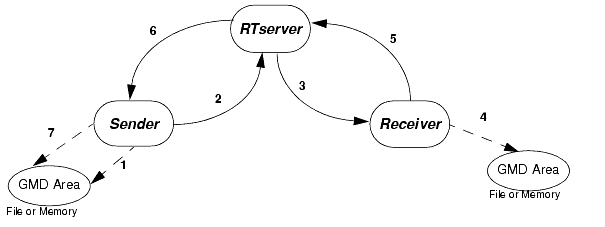
Under normal operation in SmartSockets, all messages sent through connections are delivered successfully and processed in a timely manner. If a network failure occurs, however, data can be lost. For some applications, such as bank transactions or Internet commerce, missed messages or duplicate messages are unacceptable. With GMD, an RTclient can stay informed as to whether a message was delivered to some or all subscribers. GMD fully recovers from failures and ensures that messages are transmitted as required.
There are two types of GMD:
Memory-based GMD works well for transient network problems, but it does not protect an RTclient from system crashes. Because it stores the messages only in memory, a system crash before the message is delivered can cause the message to be lost.
File-based GMD writes the messages to a file, which can be accessed for re-delivery if there is a system crash. This means file-based GMD is much more reliable, but slower than memory-based GMD. For any software product, performance is slower when data is written to disk frequently and that performance depends on the speed of your local file system. However, writing crucial information, such as a message, to disk is still the best way to ensure system reliability.
When deciding whether to use GMD, you need to decide what is most important for your system, balancing performance and reliability, and determining your tolerance for missed or duplicate messages in the event of network and system crashes.
GMD has these features:
Simply set the delivery mode property of a message using the setDeliveryMode method on the TipcMsg class or the TipcMt class, and set the delivery timeout property of a message with setDeliveryTimeout on the TipcMsg class or the TipcMt class.
Use the default settings, or set the few GMD-related options in your option database.
After you initially configure GMD for your system, certain steps occur automatically, without any intervention. Figure 10 shows the order of events:

|
TIBCO SmartSockets™ Java Library User’s Guide and Tutorial Software Release 6.8, July 2006 Copyright © TIBCO Software Inc. All rights reserved www.tibco.com |